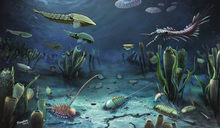Cordaticaris
Cordaticaris[a] (heart-shaped shrimp) is a genus of extinct hurdiid (peytoiid) radiodont (stem-group arthropod) that lived in what is now northern China during the middle Cambrian period (Miaolingian, Drumian).
[1] This animal was important as it was the first Miaolingian aged hurdiid known from rock layers outside of laurentia, allowing paleontologists to get a better grasp of this families geographic range in life.
They are differentiated from other radiodont groups by their large head sclerites, their tetraradial mouth-parts, and their appendages bearing around five subequal endites.
The oral cone of the animal (the circular mouth which sat underneath the head), was made up of around 32 plates, and was similar in appearance to that of the one possessed by Peyotia.
[1] The features present in Cordaticaris (cephalic carapace, elongated endites, and the oral cone shape) align it with the hurdiids.
